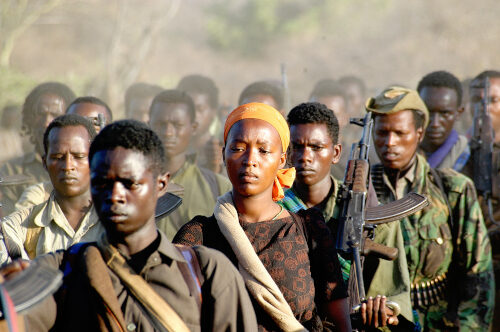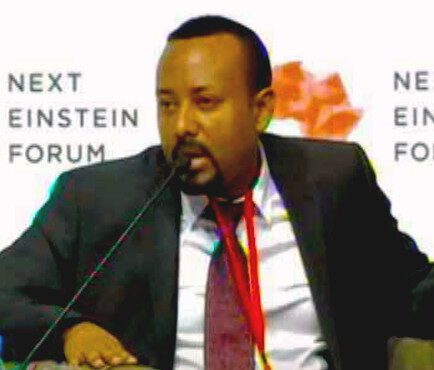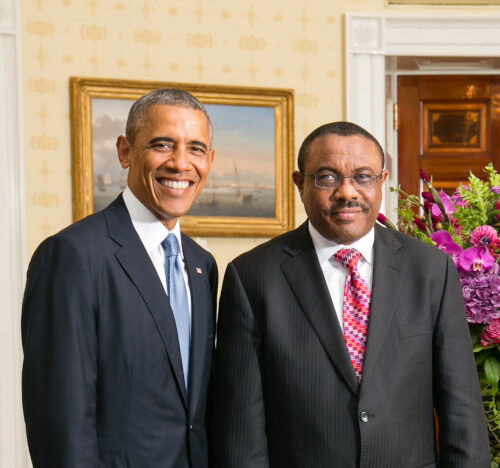A GLIMMER OF HOPE IN ETHIOPIA?

Oromo escorted away from their land by the military
News from Africa are often similar-sounding: dictators abusing power, manipulating the constitution to stretch the duration of their regimes, tribal conflicts, Islamic terror, the systematic violation of human rights, poverty and social abuse. This explains in part the fact that, when we receive different, more positive kinds of news, they are not given due prominence. Ethiopia is one of the greatest African countries with its own specific ethnicity and with a Christian majority, something very peculiar in the African continent. On May 27, Abiy Ahmed Ali, a member of the Oromo ethnic group, was elected President of the Ethiopian People’s Revolutionary Democratic Front (EPRDF). In April, he became Prime Minister, the highest office in the Ethiopian institutional system. Abiy Ahmed Ali was previously the head of a sub-party within the EPRDF called Oromo People’s Democratic Organization (OPDO). The fact that he now became Prime Minister is in itself a striking event because no Oromo had ever made it that high, seen that the Party that governs Ethiopia since 1991 has been traditionally controlled by the Tigrins, another ethnic group.
The history of the Oromo
The Oromo are the most populous ethnic group in Ethiopia. They represent 35% of Ethiopia’s 100-million strong population. They have their own language, their traditions and their social system based on clans. The Oromo inhabit Ethiopia, Somalia and Kenya and have always had separatist aspirations, which made them the target of manipulations in the territorial feud between Ethiopia and Somalia. As a consequence, they have been opposing the central authority in Addis Ababa as well. They fought in a long war under the insignia of the Oromo Liberation Army, the armed wing of the Oromo Liberation Front, supported in part by Eritrea. But neither the military defeat nor the will to abandon the armed fight (bar the 2015 attack against an Ethiopian police station) have lessened the hostility of the Oromo against the Ethiopian regime. After all – and this is perhaps the most significant element – the Oromo have been discriminated politically, economically and culturally this far.
An attempt to move past old conflicts
The move by the EPRDF to elect an Oromo can be considered a move towards reconciliation and towards a greater “democratization” in the division of power. It is an attempt to widen the social support base of the most important ethnic group in the country – numerically speaking, at least. The results of Abiy’s election, with 108 votes out of 169, demonstrates it. The election of Abiy wasn’t a wholly spontaneous decision, it was determined by the social situation which was becoming explosive: the Oromo had accused the regime of repeated violations of human rights and police brutality amid the state of emergency (indiscriminate arrests, torture, disappearance of individuals, etc.). The accusations were followed by a wave of demonstrations and clashes with authorities. To top it all, the Oromo, who were discriminated socially and politically, had called for an agrarian reform.
All of this was causing the exodus of thousands of Oromos towards Kenya to escape persecution. Initially, the regime used the iron fist, trying to crush disorders with the army and the police as internet and mass media were being blocked to prevent them from spreading the news. Inevitably, despite media barricades, the price of the blood paid to these demonstrations became public, causing continuous unrest and roughly 1000 dead from November 2015 to this day.

Abiy Ahmed Ali
The moderate solution Prime Minister Abiy represents a moderate solution to all this: he is an Oromo, a link between the demonstrators and the national security agencies; he speaks all of the country’s most important tongues (Oromo, Aramaic, Tigrin) and has the advantage – in a country where over 60% of the population is Christian and 34% Muslim – to have a Christian mother (a member of the Amara ethnic group) and a Muslim father. Because of his credentials, Abiy has the potential to bring social peace in the country. And he is also an astute politician, well-liked by both sides; he is a diplomatic man, who has a very good reputation despite his young age: 42 years. His curriculum includes a stint in the army with the rank of Lieutenant Colonel, the creation and management of a facility for Cybersecurity and a stretch as Minister of Science and Technology. All of these elements have turned his designation into a ray of hope for a more democratic Ethiopia, or at least for a more inclusive social system, where select ethnic groups are not marginalized.
The economic challenge
Currently, Ethiopia is one of the countries with the highest economic growth rate in Africa. During the past 10 years, it has grown an average of 10% annually. The challenge at hand is to let the Oromo reap the fruits of this growth together with other ethnic groups. The Oromo must be drawn to the regime through the bettering of their life conditions and by putting an end to their social and economic marginalization. Who better than an Oroma Prime Minister could possibly bring this change about? On the national level, youth unemployment is over 17%, which in itself is yet another social scourge.
The conflictual ethnic situation
Until today, power in Ethiopia was managed by the Tigrins, which account for roughly 6% of the total population. This power was won in the fight against Menghistu’s regime in 1991. In order to soften this hegemonic ethnic stance, the EPRDF is based on a coalition of 4 ethnic formations, including the OPDO of the Oroma, the ANDM (Amhara National Democratic Movement) of the Amhara (the second most populous group in the country: 30% c.ca), the Tigrayan People’s Liberation Front (TPLF) of the Tigrins and the Southern Ethiopian People Democratic Movement of the southern ethnic groups. Abiy inherits an unstable social situation plagued by feuds and social juxtapositions. The current parliament has its 547 seats occupied mostly by Tigrins from the EPRDF, a circumstance that will have to change, possibly with a widening of the political dialog.
Abiy’s predecessor, Hailemarian Desalegn, had already enacted measures for a social pacification of sorts by releasing members of the opposition and journalists who were incarcerated without a trial or specific accusations. But soon after his resignation, many of these individuals were re-arrested.

Hailemarian Desalegn with Barak Obama in 2014
The expectations arising from the designation of Abiy The first expectation, shared by a majority of Ethiopians, is that the country start a democratization of its social and political systems. This change is strongly supported by the younger generations who put a lot of trust in their new Prime Minister. Deep social reforms could only occur through a number of changes in the institutional system. In this respect, the most relevant problem is the willingness – or lack thereof – of the military and intelligence apparatuses (most of them headed by Tigrins of the TPLF) that have governed the country until today. A part of the population also sees Abiy as an individual who is colluded with power and who lacks the characteristics of a true reformer of the very same system that made his fortune. After all, Abiy is a member of the OPDO since the late 80’s. His past experience as the head of the Information Network Security Agency, a structure officially dedicated to Cybersecurity – but which also carried out monitoring of the opposition at home and abroad – is a clear indicator that Abiy is highly compromised with the current system of power. The first step needed to achieve social peace should be to put an end to the state of emergency, which represents the main instrument used by the regime to inflict abuses and limit individual freedom. The state of emergency was originally proclaimed shortly after the resignation of Desalegn, perhaps in an attempt to fill a void of power that was liable to cause further social tensions. Desalegn himself had relinquished the helm – or rather, he was forced to let go – on February 15 because he was deemed too weak in managing public order. We must therefore expect the state of emergency to remain in effect so long as Abiy fails to demonstrate that it is no longer needed. It is no bargaining chip, but a mere protective measure for the regime, which would be willing to yield only if faced with clear guarantees about their future.
An uncertain future
The Ethiopian political crisis can have strong repercussions in the wider African context and especially in the horn of Africa. Ethiopia is the second most populous country in the continent and houses all of the major inter-continental agencies. It is a major economic and military power in the region, also thanks to the coexistence of Muslims and Christians on its vast territory. An unstable Ethiopia can have repercussions on the Somali crisis, on the relationship with Eritrea, with Egypt and on the controversy over the dam on the Nile between north and south Sudan. The path that Abiy must take to bring social peace and democracy is a long and difficult one. He will have to find a way to merge the man of the regime with the man for change. Two roles that could easily collide. The positive aspect of this, which sparks new hopes and expectations, is that the regime has realized that the balance of powers within the nation must change. The inclusion of the Oromo is a part of this project and represents but the first step in the right direction. There is much to be done for the Amhara, for the Welayta of Somali origin and for all of the other marginalized ethnic groups in Ethiopia. But something is moving: recently a team of the Oromo Democratic Front, an exiled fraction of the Oromo Liberation Front, has been allowed to travel to Addis Abeba to negotiate their return home and their registration as a proper political party. But perhaps it isn’t enough to fuel grand hopes for change. 
